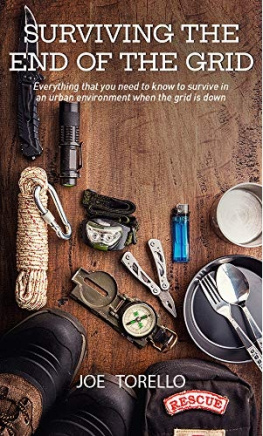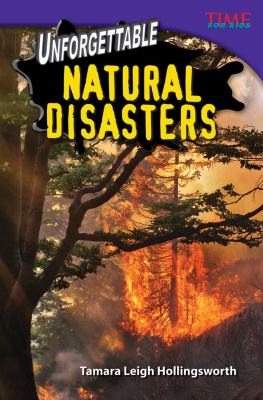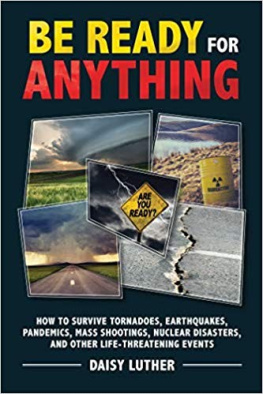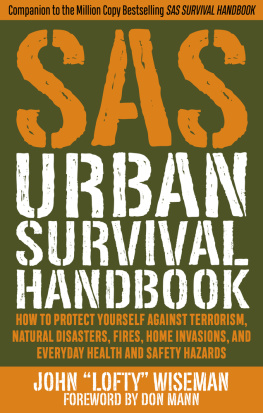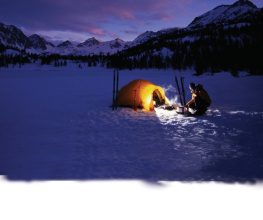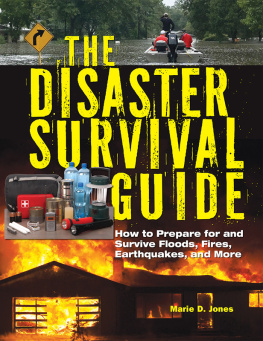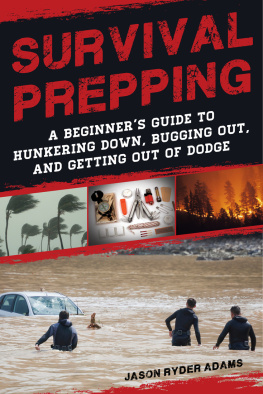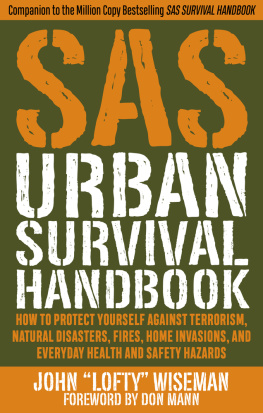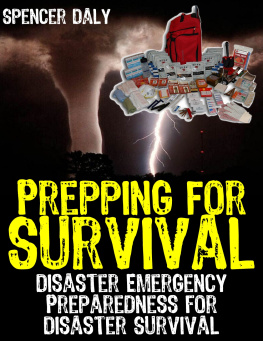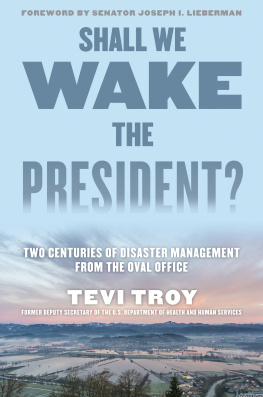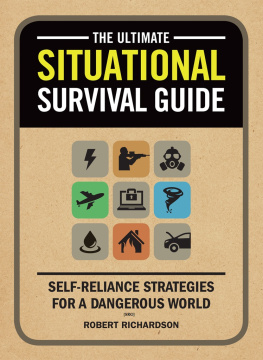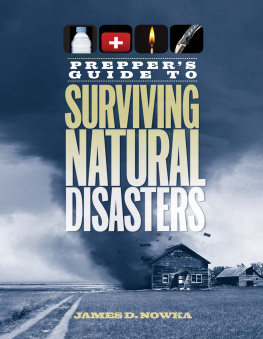Surviving the End of the Grid
Everything that you need to know to survive in an urban environment when the grid is down
Natural disasters like earthquakes and hurricanes can extract a terrible toll if people are not prepared to deal with such emergencies. Add to that the ever-present danger of terror outrages and biological and chemical weapons, and we can see that the world is becoming an increasingly unsafe place
By Joe Torello
Disclaimer
Joe Torello, 2020 All Rights Reserved
Joe Torello, 2020
No part of this book may be reproduced, transmitted, or stored in any form or by any means, including electronic or mechanical, without prior written permission from the author.
The contents of this book are of a general nature only, and should not be relied upon wholly and solely when making any decision regarding a survival situation. The author and the publisher of this book will not bear any liability from any actions derived from the contents of this book. One should always seek third party information from relevant and associated parties such as professional medical experts, preppers, and people who know how to deal with survival situations and the like, before executing the strategies in this e-Book. While the author has taken the greatest efforts to ensure the accuracy of the written content, all readers are advised to use the information mentioned in this book at their own risk. The author and publisher cannot be held accountable for any personal or commercial damage caused by misinterpretation of any material presented in this book. All readers are encouraged to seek professional and legal advice, as, and when needed.
Prelude: Surviving the End of the Grid: Everything You Need to Know to Survive Urban Chaos
Urban survival is a very central topic of discussion these days, thanks to the global COVID 19 pandemic. Apart from that, terror attacks and riots can also cause a complete breakdown in the kind of services we take for granted. We have only to remember the LA riots of 1992 to see how rapidly urban disasters can unfold and engulf an area.
Epidemics, pandemics, and global devastations can lead to a complete shutdown of all economic and social activities. Such situations have been regularly occurring throughout the ages, and the case is no different today.
Natural disasters like earthquakes and hurricanes can extract a terrible toll if people are not prepared to deal with such emergencies. Add to that the ever-present danger of terror outrages and biological and chemical weapons, and we can see that the world is becoming an increasingly unsafe place. However, it doesn't have to be this way at all if you know what to do to survive the toughest situations:
This book will prepare you for the following:
Surviving without access to civic amenities
Conserving water resources
Fighting and holding your own against rioters and mobs
Ensuring hygiene and sanitation without a working sewerage system
Making your home as self-reliant as possible
The top food items you need to survive
Creating a safe haven inside and outside the house
Preserving heat or cooling the room without grid-supplied energy
Learning first aid techniques that you can practice at home
The different kinds of combat weaponry you will need to use to defend yourself
1 Why We Should Learn to Survive Without Access to Any Sort of Civic Amenities
T he Los Angeles riots and the devastation wreaked by Hurricane Katrina have served to show us precisely who fragile human society is, and how easy it is to disrupt everything we take for granted.
The Coronavirus has bought our entire planet to a standstill. If the situation escalates, it is only a matter of time, before the world as we know it, will cease to exist.
Under the circumstances, we can see that depending on civic amenities to get us through our day to day routine just simply won't be enough. We might have to survive off the grid. And, to do that, we will have to be prepared for the worst. Not just mentally but physically as well. But perhaps most importantly, we have to be armed with the knowledge necessary to ensure our survival. This is what this book is all about.
From Terror Outrages to Natural Disasters: The Work Is Becoming Increasingly Unsafe
There was a time when we used to see natural disasters, wars famines, and terror acts as things that only happened to other people. But the unprecedented turmoil taking place all over the world has rapidly changed the way we think and live. This holds particularly true for urban environments rather than rural ones, thanks to the sheer number of people packed together in the same place.
If there is any interruption of civic facilities and especially law enforcement services, it will almost automatically lead to a rapid collapse of the social order as well as the social contract between people and the state. Crowds of rioting marauders may take advantage of the breakdown to rob and plunder with impunity. Do you think it can't happen? Think again. It has happened, and it will happen. The minute the power of the state and all its amenities recede, the law of the jungle takes over. The strong take from the weak and abuse their strength with near callous authority. History is replete with such incidents from all over the world. Let us study a few examples:
The Indian partition riots of 1947 lead to the creation of India and Pakistan. There was a gap of around six weeks, in the time the British left South Asia and for the new states to take over their responsibilities. In that time over a million people were slaughtered and tens of millions were forced out of their homes in the largest mass migration in human history
Apart from that, there was the Rwandan disaster in the 1990s. The death of the political leadership led to a terrible crisis in that country. Let us see how it unfolded:
In the spring of 1994, an aircraft blew up in the central African region. This plane was carrying the Rwandan President Juvnal Habyarimana.
The Rwandan Genocide
Rwandan society was divided into two main ethnic and tribal groups. The majority Hutus and the minority Tutsis. The decimation of the political leadership of the country unleashed a wave of brutality that had not been seen since the end of the Nazi regime. The extremist Interahamwe Hutu militia set up roadblocks to liquidate everyone who appeared to be a Tutsi. They used the Panga, a machete used to clear brush to chop their victims to death.
A few murders were committed, and when no one stopped them, the powerful militants simply grew bolder and bolder. Soon mass murders were being committed at hastily improvised street blocks that sprung up all over the capital Kigali. And with a complete vacuum at the governance level, the violence proceeded to spread to other cities. There were gangs of mass murderers who methodically went from street to street and from house to house, chopping people into pieces, in a full-on genocide!
In the 100 days when the Interahamwe ruled the cities before the world reacted, over a million people had been butchered. They were killed in churches in schools and in their homes, and this was not all. Around half a million women were victims of brutal sexual assault.
The purpose of the above examples is to show how tenuous law and order is, and how we believe that it will continue to last forever, just because it has done so in the past. That the grid will always be there to take care of us and protect us against a dark and uncertain world. Then, there is the increasingly pressing threat of climate change and the massive natural disasters that are now become a regular occurrence in an unprepared world.
Massive fires are raging from east to west, and category five hurricanes are now prevalent all over the coast. Add to that the fact that unpreceded heat waves have made life unendurable for people in many parts of the Earth, while winters have now started becoming much colder than at any time in recorded history.

